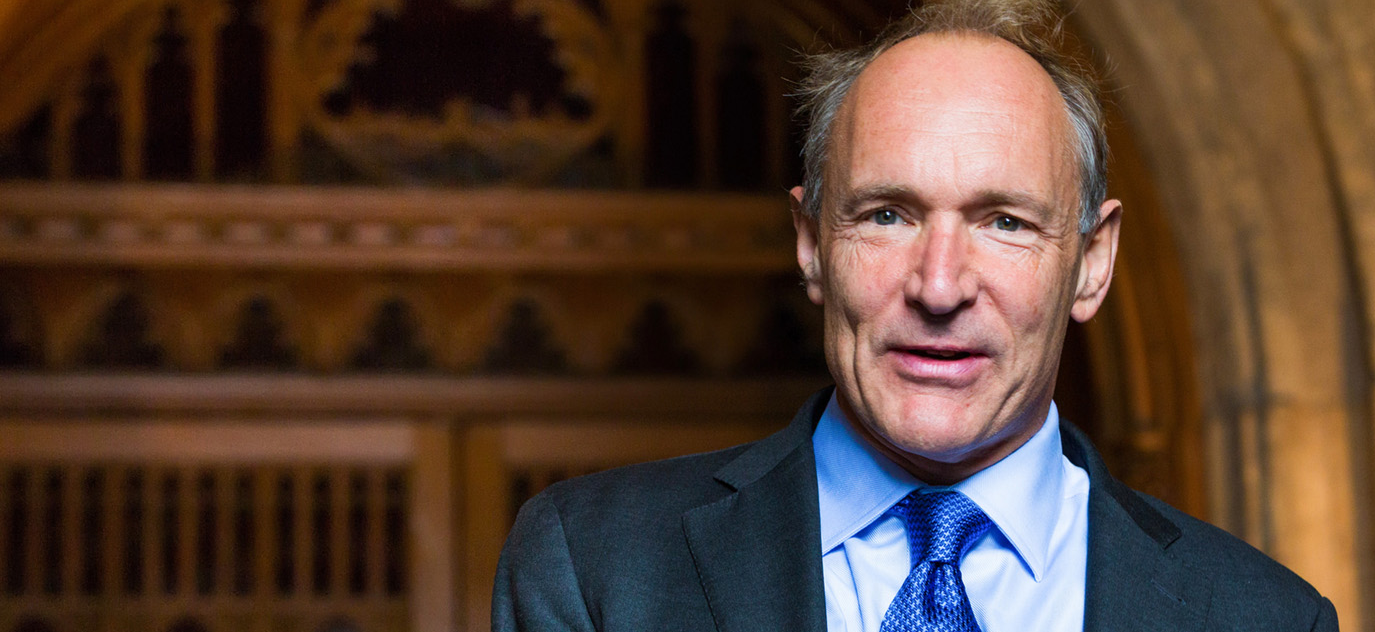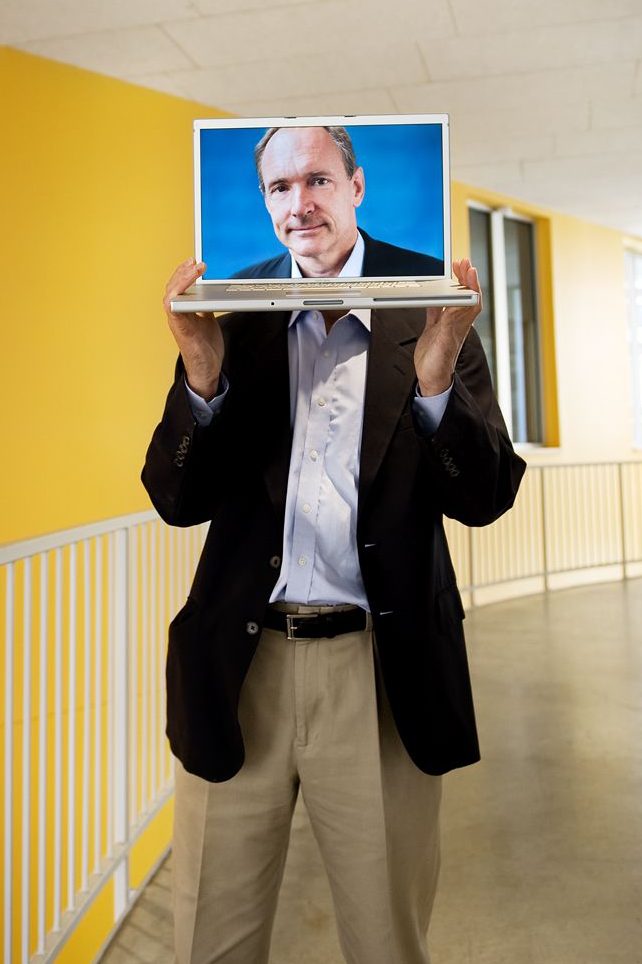
Tim Berners-Lee
Changed Modern
Society?
An Essay by Katie Donnelly

An Essay by Katie Donnelly
Sir Tim Berners-Lee invented the World Wide Web in 1989 which in turn changed the world forever. He is a graduate of Oxford University and director of the W3C, Web Standards organisation and the World Wide Web Foundation. (World Wide Web Foundation, 2021) I am going to be looking at how his creation and development of the web has influenced and changed modern society.
Tim Berners-Lee invented the Web while working at CERN, Particle Physics Laboratory. Throughout his software engineer job, he was constantly meeting scientists from all over the world who came to visit the lab in Switzerland, but they were faced with the challenge of sharing information with one another.
"In those days, there was different information on different computers, but you had to log on to different computers to get at it. Also, sometimes you had to learn a different program on each computer - " - Tim Berners-Lee (World Wide Web Foundation, 2021)
In an attempt to solve these issues, Tim realised they could share information with one another using an emerging technology known as Hypertext. This meant that the scientists no longer had to log into each other's computer systems to access information saved onto the computer's hard drive as this process was very time consuming. Therefore in 1989, Tim went to his boss with his vision of the creation of the web in a document known as Information Management: A Proposal. His proposal was not initially accepted as his boss had written on the cover, "vague but exciting." It took another year for Tim Berners-Lee to be given time to start writing the code for his project and in September of 1990, he finally got the opportunity to do so. (The Guardian, 2019)

By the end of 1990, Berners-Lee had written the first web client server creating the web technology spread which were specifications of URIs (Uniform Resource Identifiers), HTTP (HyperText Transfer Protocol) and HTML (HyperText Markup Language). He created the first web page browser, "WorldWideWeb.app" which quickly grew popular with designers, making Berners-Lee consider releasing it to the general public. This would allow anyone across the world to browse the web. This then became a reality in April of 1993, beginning the global wave of creativity and collaborations which had never been possible before. (CERN Accelerating Science, 2021)
Tim Berners-Lee believes that if the technology used to create such an extraordinary thing actually belonged to him, then it likely would not have taken off as it would be extremely difficult to take control of the web fully while it still becoming a universal space for everyone else to use. He envisioned that his invention could become a total destroyer of the world had it of gotten into the wrong hands.
From the moment the web was created until now, it has grown to become a part of everyone's daily life whether that be for communication, education, employment or recreational use. It began as a research-based search engine and has now become a lifestyle that society has conformed to. Now, at the click of the button, our screens can be flooded with information, images or services from one side of the globe to another. Many businesses communicate with their customers solely through online systems such as "Just Eat" or "Deliveroo" in which you can order food from numerous restaurants or take-aways and it can be delivered to you within minutes. Not to mention the use of next-day delivery services such as "Amazon Prime" which allow customers to order items to arrive the next day without even having to step one foot out the front door.
This massive change of the internet has brought around many positive outcomes and opportunities for people such as increasing job opportunities or expanding the search for a new job. For example, those seeking jobs can sign up for free websites such as "Indeed" or "Total Jobs" which can connect them to an employer almost immediately rather than having to visit them in person. In addition to this, the use of technology to create excellent CVs which can be sent off via email rather than hand delivered. Similar opportunities arise with small businesses selling their work on websites such as "Etsy" which is a great steppingstone in expanding their business and gaining global recognition of their work from customers all over the globe.


Social media use has skyrocketed over the past decade and a half where only 5% of adults in the USA reported using a social media platform in 2005. That number is now around 70%, if not more. (Allen, 2019) While the internet has brought around lots of positive outcomes for society whether that be keeping in touch with distant relatives or finding an outlet for creativity and self expression, it has also brought a lot of negative outcomes, particularly with the rising use of social media.
Some believe that the constant distraction of social media contributes to shortened attention spans. In addition, many people who regularly use platforms like Facebook or Twitter report higher levels of stress and anxiety. (questioneverything39, 2019) However, one major concern for the modern society due to social media use, is the concern for mental health issues.
It can become very addictive for young people to constantly update their profiles to portray a 'perfect' lifestyle that is totally unrealistic, rather than living in the moment and enjoying themselves. This can take a huge toll on someone's mental health as they are constantly comparing themselves to another user's profile which has been modified to look almost perfect and could therefore deem themselves 'boring' or not good enough. Not to mention, celebrities who update their profile's daily, flaunting their materialised lifestyles, huge purchases and unrealistic body expectations.

In many instances, celebrities or influencers have been caught in the act of photoshop, changing their body form to look more appealing. The Kardashian-Jenners spring to mind in this case as they have been repeatedly known for indulging in photoshop tools, sometimes taking it a tad too far and can cause fans to bully them for doing so. This has previously resulted in a few posts being removed or comments turned off as fans claim they didn't even recognise them when they scrolled down their feed. This can be detrimental for not only the public viewing the photos and comparing themselves to them but also for the celebrities who receive vast amounts of hate comments under their photos.
"Unreasonable or impossible standards of beauty created by photo retouching can result in individual feelings of being flawed, not measuring up, or not being good enough. Over time, it's possible for an individual to internalize these feelings, which may result in low self-esteem, reduced self-confidence, and feelings of sadness and/or depression" (CMGHealthFitness, 2019)
The use of the internet and social media has had a huge impact on education and has brought many positive outcomes, particularly in today's generation. Now, almost instantly we can find information online which would once not be available. This is particularly useful when researching for homeworks or projects or looking up visuals such as videos or photos which relate to what is being taught in school or university as they are accessible to almost everyone. This can save a lot of time than perhaps travelling to a library, digging through all the shelves and books to find a snippet of information which can otherwise be found at the click of a few buttons.

The internet was a hero in 2020 when it saved schools and colleges during the coronavirus pandemic, making traditional, face-to-face teaching ways almost impossible. This meant that students had to log onto virtual classes, on "Zoom" or "Blackboard Collaborate" and read their homework from a class blog or on Google Classroom. Having these online tools meant that students were able to stay on top of their studies and not have to potentially repeat the year. I found that video call lessons were the easiest to stay interacted and it was the most realistic to the classes we were previously used to instead of trying to motivate ourselves to catch-up on pre-recorded material.
In conclusion, it is clear that Tim Berners-Lee has had a monumental impact on changing modern society and how we live our lives today. Without the world wide web, there wouldn't be worldwide communication available which aids us in distributing products and services globally, keeping in touch with distant relatives and not to mention, the everyday use of social media. It has also hugely impacted young people, in particular students as they have access to more sources and information than ever before. However, it is important to highlight some of the negative impacts it can have on society as not everything that is read online is reality and can create false expectations for young people which can have a toll on their mental health. Overall, the endless opportunities that the web has created for society has shown us how Tim Berners-Lee has positively changed modern society.